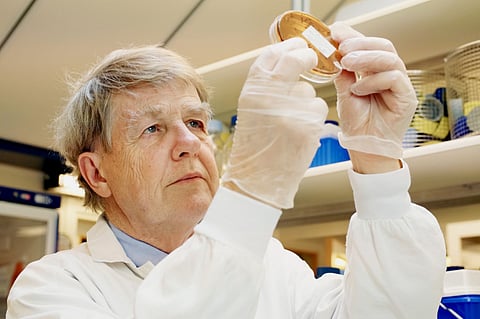Probiotics: Human body’s health sentinels
Microbes could also assist with weight loss and slow the ageing process

Dubai: There is some good news for those suffering from modern lifestyle diseases. Probiotics that are actually microorganisms like bacteria that exist in our gut, have the power to slow down ageing, control the advent of serious lifestyle diseases such as heart disease, hypertension, irritable bowel syndrome (IBS), Crohn’s disease, ulcerative colitis and even help with weight loss.
Professor Dr Bengt Jeppsson, former Assistant Dean at Lund University, Sweden and a specialist in probiotics, spoke to Gulf News on the power probiotics have in nurturing wellness and keeping serious diseases at bay.
“All modern lifestyle-related diseases are inflammatory in nature and inflammation makes the diseases progress. That is true for cardiovascular diseases, diabetes, inflammatory bowel diseases and stress to name a few. Old age is also accompanied by a slow increase in inflammation. Inflammation has a negative effect on gut bacteria and this may be counteracted by the intake of probiotics,” he said.
Probiotics play a definite role in anti-ageing as they have antibacterial effects and help in altering the pH (acid–alkali) balance) of our bodies, which is mainly mediated via fermentation and production of polyphenols.
“The antibacterial effect is via several mechanisms,” said Dr Jeppsson. “One is by altering pH in the gut — the largest groups of probiotics are lactobacilli and they produce lactic acid that lowers pH in a way that hinders other bacteria to grow and thrive. They also compete for nutrition in the gut and making less nutrients available for other bacteria. A fourth mechanism is by firm attachment to intestinal cells, thus making little room for harmful bacteria to interact with the intestinal wall and finally probiotics produce antibiotic-like substances (called bacteriocins.)
Our gut is teeming with probiotics. They were probably used in our food for more than four million years as probiotic-like lactic acid has been found in the gut of prehistoric humans. Our body contains more bacterial cells than human cells by a factor of ten, Dr Jeppsson says.
“We have about 1kg of bacteria mainly in our digestive system and for our well-being it is important that we maintain good cooperation between the different members of the gut bacteria, that we consider to be an organ by itself and the rest of the body,” he said.
The important thing is to maintain the delicate balance between health-promoting and disease-causing bacteria in our gut.
“Probiotics maintain a good balance in the gut suppressing the “bad” bacteria; are important for the well-being of the cells lining the intestines; suppress inflammation [even outside the gut] and stimulate the immune system, so that it is always on high alert to fight invading bacteria or other harmful substances,” he said.
Immune system
In a society like the UAE, which has a high incidence of lifestyle diseases, Dr Wafa Aish, head of clinical nutrition at the Dubai Health Authority, advises people to have a lot of probiotics in the form of pills and in natural foods.
Probiotics help keep the intestines healthy and assist in digesting food. Researchers believe that some digestive disorders happen when the balance of friendly bacteria in the intestines becomes disturbed. In societies with very good hygiene we’ve seen a sharp increase in autoimmune and allergic diseases.
“That may be because the immune system isn’t being properly challenged by pathogenic organisms. Introducing friendly bacteria in the form of probiotics is believed to challenge the immune system in healthy ways,” she said.
Sign up for the Daily Briefing
Get the latest news and updates straight to your inbox



